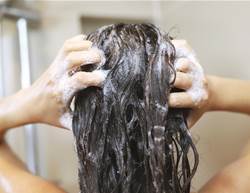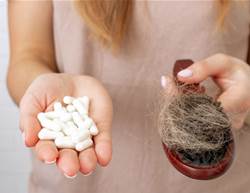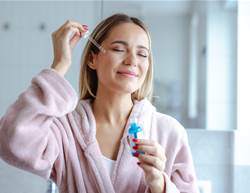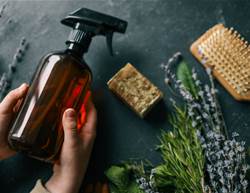Also known as vitamin B7, biotin plays an important role in helping the body metabolise proteins, which are needed to produce healthy skin, hair, and nail cells. People who are severely deficient often end up with hair loss, eczema, and brittle nails, and supplementing can help correct those problems, explains dermatologist Dr Melanie Palm.
But if you already get the recommended 30 micrograms of biotin daily, loading up on extra won’t give you a beauty boost, according to a review of 18 studies. As long as you eat a balanced diet, you’re almost certainly getting your fill. The nutrient is found in eggs, salmon, pork chops, hamburgers, sunflower seeds, sweet potatoes, almonds, broccoli and spinach.
Plus, a recent study from the Journal of the American Academy of Dermatology found that taking biotin supplements can interfere with various lab tests including those for thyroid issues and cardiac arrest.
“Stop taking biotin for two days prior [to blood tests] and let your doctor know about this supplement if you are undergoing thyroid function blood work,” says Dr Zalka.
2. Prenatal Vitamins
Pregnant women are known for having thick, lustrous hair that grows really fast. But contrary to popular belief, it’s not because they’re taking prenatal vitamins.
“It’s more likely the hormones of pregnancy, not the vitamins, that are enhancing hair growth,” says dermatologist Dr Sheryl Hoyer.
In fact, there’s zero evidence that prenatal vitamins do anything for hair growth, whether you’re pregnant or not, she adds. So unless you’re having a baby (or trying for one) don’t bother buying these.
3. Keratin
Keratin is the structural protein that makes up the outermost layer of hair, skin, and nails. Our bodies make plenty of it on their own, but beauty buffs often claim that supplementing can make hair stronger and shinier. Again, there’s no evidence to back this up.
In fact, keratin is highly resistant to the digestive acids in your stomach, so taking a supplement could cause more harm than good. “Cats who regularly groom themselves with their tongues often form hairballs in their intestines that they eventually vomit, because they can’t ingest the keratin in their fur,” Dr Hoyer says. You don’t want to end up like that, do you?.
4. Collagen
Like keratin, collagen is a naturally occurring structural protein that gives skin its smooth, plump appearance. And when production dips with age, wrinkles start to form.
So is supplementing the fountain of youth? One small industry-funded study did show that women who took ampoules that included 2.5 grams of collagen peptides for 12 weeks did have improved skin hydration, elasticity, roughness, and density. Independent studies are far and few between.
But it’s not a surefire solution. “In your gut, collagen [that you consume through food or a supplement] is broken down into amino acids. And it’s at your body’s discretion how those amino acids are used,” Dr Palm says. “It could become proteins to help your blood vessels, repair your liver, or stimulate your brain, not necessarily amino acids to produce collagen.”
In other words, collagen might be a beneficial anti-ager, but there’s no guarantee.
5. Vitamin C
It’s an antioxidant, and a potentially potent one at that. Vitamin C has been shown to protect against ageing and skin cancers by boosting the production of collagen, preventing collagen from degrading, and fighting the formation of melanin (skin pigmentation), Dr Hoyer says.
The problem? Even at high doses, only a fraction of that vitamin C supplement actually makes its way into your skin.
Topical products that contain vitamin C (typically in a serum) are well-studied and more effective. But creating a stable formula is very tricky, so be sure to go for dermatologist-approved brands that are backed by clinical testing and contain L-ascorbic acid.
6. Omega-3s
Here’s the one supplement that might actually do you some legit good. These essential fatty acids provide must-have nutrition for healthy hair and skin cells. “Our skin cell membranes are composed of a cholesterol-derived layer, and omega-3s are needed to help maintain that. In the same way, they help with the integrity of the hair,” Palm says.
In other words, getting your fill just might contribute to a glowier complexion and shinier strands. If you don’t regularly eat fish like salmon and tuna, aim for 500mg of DHA and EPA (the most potent types of omega-3s, which are found in fatty fish) daily.
7. Zinc
Zinc is a popular ingredient in acne-fighting face washes and spot treatments, and some studies have found that taking it orally may help combat inflammatory skin conditions, like acne and rosacea. That’s why Dr Zalka recommends it to her acne patients who are hitting low levels.
However, the current evidence is insufficient to blanket recommend the use of zinc supplements for skin conditions.
Zinc also plays a role in cell division and protein synthesis, so if you have dry or weak nails, it may be a sign that you aren’t getting enough through food.
Women can hit the daily recommendation of 8 milligrams by eating oysters (the best source of zinc), beef, fortified cereal, baked beans, lobster or crab, nuts, cheese, oats, chicken, and yoghurt.
The bottom line
Beauty supplements have mixed reviews from experts and consumers alike. And while the market for them is super convoluted, there are a number of well-trusted brands. Just remember, if you do plan on taking a supplement, always consult your doctor first.
“One can overdo it on vitamins. Do not think a little is good and a lot is better,” Dr Zalka says. “Before starting any supplement regimen, check with your trusted health care provider, especially if you’re pregnant.”










